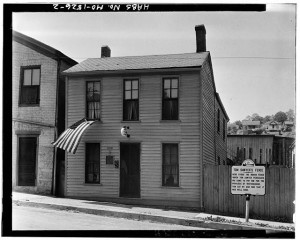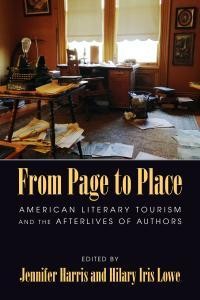 Mark Twain’s Homes and Literary Tourism
Mark Twain’s Homes and Literary Tourism
Since shortly before his death, local boosters, Twain fanatics, scholars, and others—have wanted to see where Mark Twain (and Tom Sawyer and Huck Finn) lived. These fans put a great deal of faith in his houses as places where they could access the “real” Mark Twain. At his houses, now museums, Twain remains as popular as he ever was during his lifetime. Focusing on the history of Florida, Missouri; Hannibal, Missouri; Hartford, Connecticut; and Elmira, New York at the moments when members of these communities made the decision to “save” the historic structures associated with Twain in this book, Hilary Iris Lowe examines our popular devotion to Twain during the twentieth century and how the rise of his house museums have changed the way we understand Mark Twain.
For a recent review of the book, see Kathleen Corbett’s review in The Public Historian.
From Page to Place: American Literary Tourism and the Afterlives of Authors (collection edited  by Jennifer Harris and Hilary Iris Lowe)
by Jennifer Harris and Hilary Iris Lowe)
Literary tourism has existed in the United States since at least the early nineteenth century, and now includes sites in almost every corner of the country. From Page to Place examines how Americans have taken up this form of tourism, offering an investigation of the places and practices of literary tourism from literary scholars, historians, tour guides, and collectors. The essays here begin to trace for the first time the histories of some of these sites, the rituals associated with literary tourism, and the ways readers and visitors consume popular literature through touristic endeavors.
“To Keep a Birthplace” An Administrative History of John Fitzgerald Kennedy National Historic Site
Every president is remembered somewhere. These commemorative efforts are marked in lavish marble monuments, memorials, historically accurate historic house museums, and presidential libraries. Each of these sites of presidential memory is unique. Over the more than 50 years the John Fitzgerald Kennedy National Historic Site in Brookline, Massachusetts has been open to the public, staff at the Kennedy birthplace have faced many of the same challenges: parking, space limitations, interpretive concerns, concerns about respectfully representing the history of a powerful political family, and wear and tear on the structure itself. They’ve also faced struggles over interpretation, whether to focus on Kennedy’s childhood, the early married lives of his parents, Rose Kennedy’s commemorative efforts, or Kennedy’s presidential legacy. Each thematic focus has produced extensive research and interpretive work at the site. The history of these efforts reveals much about how an extraordinary history can be held in a home that is deceivingly ordinary at its surface.

